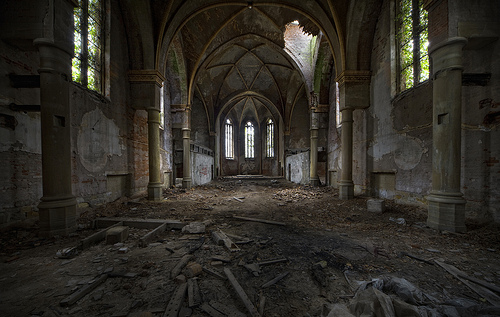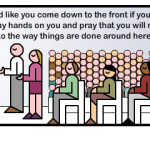We run our website the way we wished the whole internet worked: we provide high quality original content with no ads. We are funded solely by your direct support. Please consider supporting this project.

How To Fix The Church: The Kingdom of God (Part 4)
God has leveraged everything on the Church loving like Jesus loved, as outlined in our previous posts in this series. “By this the world will know you are my disciples,” Jesus said, “by your love” (Jn 13:35). By God’s own design, Christ-like love is supposed to be the proof that Jesus is real. In John 17 Jesus prayed that the community of his disciples would embody the perfect love of the Trinity so that the world would know he’d been sent by the Father (Jn 17:23). Think of the implications of this phrase, “so that.” Above all, we are to be known for the way we manifest the perfect love of the Trinity. We are to be known for our scandalous willingness to love the unlovable, even our enemies—even Islamic terrorists. Our lives are to be so unique that they raise the question in the minds of unbelievers that only accepting the reality of Jesus Christ can answer: namely, why do you love me and sacrifice for me the way you do?
But let us be completely honest. Is the Church consistently putting on display this Jesus-looking, Calvary-quality love? Which is to ask: Is the Church advancing the Kingdom of God? Ask yourself: Are many non-believers walking around wondering why we Christians sacrifice so much in service to them?
Consider that Jesus’ love attracted the vilest of sinners—the tax collectors and prostitutes—just as they were. Are the tax collectors and prostitutes of our day beating down our doors to hang out with us? Do they find that they experience a kind of love and non-judgmental acceptance when they hang out with us that they can’t experience anywhere else?
We don’t have anything close to the reputation Jesus had. If anything, we have the opposite reputation. Ask any random sampling of non-Christians what first comes to mind when you mention “evangelical “ or “born again” Christians. Does anyone for a moment think their first response would be “scandalous, sacrificial love”?
The one thing that matters, the deal breaker, the all-or-nothing of Kingdom life, the thing that God has leveraged everything on, is desperately missing in the Church. No heresy could possibly be worse! (Yet, oddly, never have the heresy hunters in the past or present gone after this heresy!)
What can we do about this catastrophic heresy? How can we infuse Calvary-like love into the Church? How can we transform the Church from a meaningless religious institution into the Kingdom of God?
I’ve come to believe that this is actually the wrong question to ask. The right question—and really the only question any of us need to answer—is this one: Am I myself willing to live in love as Christ loved me and gave his life for me?
This question is much more difficult than the question about how to fix the Church. I’d much rather worry about why the Church at large isn’t more loving. I’d much rather immerse myself in complex theological issues about the Kingdom. I’d much rather talk about the Kingdom than be confronted with the personal task of actually doing it.
The only question I need to answer, and the only question you need to answer, is not one you or I can settle in our heads. It can only be answered with our hearts on a moment-by-moment basis. It is this: Are we willing to love as Christ loved, right here and right now? Are we willing to die to ourselves and bleed for this person, and now for that person? We answer the question of whether we are Kingdom participants not once and for all, but with how we treat each and every person we meet, with every choice we make, with every breath, heartbeat and brain wave that is our life. The Kingdom question is always concrete and existential, never abstract or theoretical.
I’ve discovered that living in this commitment has freed me from my life-long proclivity to be cynical about the Church. As I remain fully devoted to the single task of receiving and replicating Christ’s love in the present moment—toward this person, and now toward that person—I simply don’t have mental or emotional space to worry about or even notice who else isn’t replicating Christ’s love. Fixing them, or fixing the Church, or fixing the world, is not my job.
Image by [AndreasS] via Flickr
Category: General
Tags: Church, Jesus, Kingdom, Kingdom Living
Topics: Following Jesus
Related Reading

Christian Utopia
Fergal of Claddagh, OP via Compfight A little meditation on Christian Utopia and the Body Politic as we stand poised on the eve of the election in America. We affirm that Jesus will indeed “establish His kingdom on earth” but it won’t come through the exercise of power. Rather, God’s kingdom will come as his…

The Wrong “Bulls-Eye”: Reflections on the “Christian Left”
As it has since the fourth century, the Church today for the most part operates with a Constantinian (“power-over”) paradigm. Because of this, most socially concerned Christians are inclined to define the Church’s mission as adjudicating between and tweaking political options “in Jesus’ name.” We accept Caesar’s definition of “power” as the ability to get…

God Made Visible
During Advent, we celebrate and bring to the forefront of our imagination the God who was made visible. The Gospel of John sums up the advent of God with one sentence: “And the Word became flesh and lived among us, and we have seen his glory, the glory as of a father’s only son, full…

Which of the Miracles of Jesus Can Humans Do? (podcast)
Greg is asked about the miracles of Jesus, specifically which miracles do we have the potential to perform. He also gives a nod to the band Theocracy. Episode 74 http://traffic.libsyn.com/askgregboyd/Episode_0074.mp3

Part 3: Disarming Flood’s Inadequate Conception of Biblical Authority
Image by Ex-InTransit via Flickr In this third part of my review of Derek Flood’s Disarming Scripture I will offer a critique of his redefined conception of biblical inspiration and authority. I will begin by having us recall from Part I that Flood holds up “faithful questioning” over “unquestioning obedience” as the kind of faith that Jesus…

